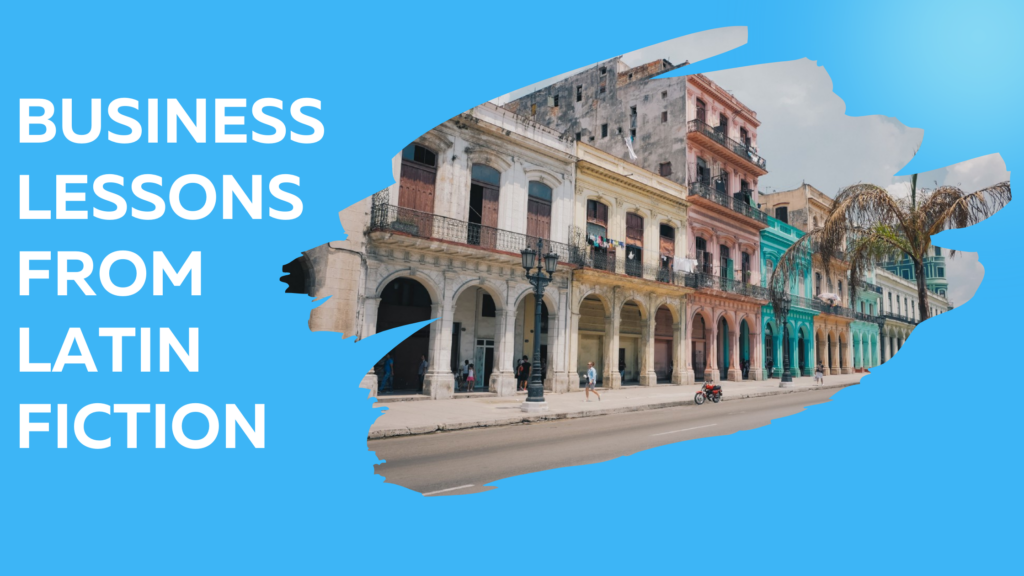Things We Can Learn From Timeless Characters Created by Diverse Voices
Once, I heard somewhere that non-fiction gives you knowledge, experience gives you wisdom, and fiction helps us navigate the human condition. A well-read leader knows the value of all written works and the importance of diverse forms of content. We become better at creating something out of nothing, empathizing with others, and building a lasting legacy.
Recently, I read a list of “Great Books” that focused on classical works like novels, philosophies, and histories. It was a great selection, and I added many of them to my list for this year. These works help us build our character, learn from the past, and create a better business.
However, at first glance, I didn’t notice many Latin American works. There are many lists like this, and I’ve always felt they’ve missed out on a lot of value. So I’ve highlighted three of them and some of the lessons we can learn.
1. Hook Your Audience with Something They Can’t Ignore
One of my all-time favorite lines in a book comes from One Hundred Years of Solitude by Gabriel García Márquez. He introduced the novel with, “Many years later, as he faced the firing squad, Colonel Aureliano Buendía was to remember that distant afternoon when his father took him to discover ice.”
When I first read it, I had to digest it multiple times. This powerful sentence includes many components that make you want to finish the thick book right away. That’s a big deal, considering our attention span and how most website visitors will only land on a site for a few seconds. The impact of this opening line would make any copywriter excited.
“Many years later…” invokes a past and context that the reader needs to know, but she has to read more to find out. “As he faced the firing squad…” gives us a sense of danger and urgency because someone is about to die. And why is he facing death anyway? We get a name, “Colonel Aureliano Buendía,” which hints that this might have been from war or a revolution and a distinguished military official getting executed like this makes you wonder who the enemy is.
And then, of course, the Colonel strangely veers off into memory in the “distant afternoon” when he discovered ice with his father. Who would see ice for the first time? Why did it make an impact on him? And why does he remember it now?
This one sentence grabs the reader and pushes them off the cliff to read hundreds of pages to unravel it and find the answers.
When we are thinking of ways to capture an audience, we should always consider this line. How can we market a brand in one sentence that offers something they can’t refuse?
This sentence has a thirst for context, urgency, and excitement. It offers a promise of value: a great story. When the sentence ends with ice, it’s the slam dunk that leaves its audience with no choice.
2. Master Your Craft and Then Let it Teach You
A brand stands out by becoming the best or providing unique value to the market. To succeed and differentiate ourselves through the noise, we strive to build better services and products. This is the key to growth and a promising future.
Paulo Coelho, the author of The Alchemist, gives us another parable in his book The Archer. It’s about a town carpenter in Japan named Tetsuya. A stranger approaches Tetsuya to challenge him in an archery challenge. Unknown to Tetsuya’s young apprentice and everyone else, is that he was known as the best archer in the nation. Tetsuya retired in silence, and no one knew where he was or who he had become.
Tetsuya defeats the stranger and has him promise not to tell of his whereabouts or identity. The rest of the parable follows his apprentice’s request to learn how to be an archer.
Readers learn about the significance of the bow and what it represents; how the arrow must have an exact target or the archer will fail; and much more. The most notable lesson was how Tetsuya still considered himself an archer. He was a carpenter by trade but an archer in spirit. It was a lifestyle.
How we focus, set goals, treat the resources we have, plan, and take action is all learned through his archery.
When we develop great products and services, we become the masters in what we do. Our customers and clients love it and become superfans. But there comes a point when we have to learn from the art itself. We listen to what our customers say. We build a company and brand culture rooted in the product itself. We allow our craft to speak to us and teach us to become better at what we do.
It’s an awareness and willingness to grow.
3. Be Cautious of the Next Shiny Thing
We know how important it is to focus on one thing. Do it well and keep it simple. As a business grows, it can expand features or its product line to meet the needs of its specific audience. But we often get tempted to chase something that’s more exciting. It’s alright to abandon a failing project, but when something is going well, and we swerve off the lane, we can risk everything.
In Adolfo Bioy Casares’ book, The Invention of Morel, he introduces us to an unnamed narrator called “the fugitive.” He’s also the main character who, in trying to escape from the law, finds himself hiding on an uninhabited island with no hope.
As time goes on, he strangely discovers a group of tourists. He notices a beautiful woman named Faustine. He wants to say hi to the group, but he’s afraid they will turn him over to the police. Suddenly, they vanish. The next day he sees the same group, but as time goes on, he notices they are living in a repetitive cycle. Still, fueled by his growing love for Faustine, the fugitive is curious and continues watching her.
Eventually, he discovers that what he is experiencing isn’t real. The tourists are only a recording on the island powered by a powerful machine that was once an experiment. The machine is also producing radiation on the island, and the fugitive learns that he will die soon.
He doesn’t want to die, and he wants to be with Faustine, though her physical body is long gone. He finds a way to insert himself in the recording. He coordinates his conversations and interactions with the old cycle as if he was originally there. The fugitive sought immortality but staying on the island caused his physical death.
When we look at the fugitive’s original goal in the book, we remember that he’s escaping the law. He wants freedom and to preserve his life. When he sees the tourists, everything he wanted gets derailed into a passion for an unrealistic love and a shadow of immortality. He lost his life for it.
As we develop projects and businesses, we can remember this tale. Focus on what’s important. Don’t get distracted. Because if you abandon your one thing, you might lose it.
Latin American Literature has a lot to teach us. When we open our minds to new perspectives and read works from diverse authors, we can create a better business and grow as leaders.


